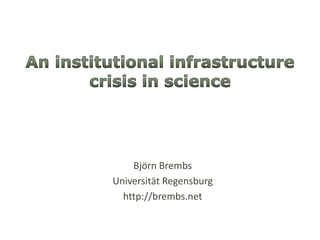
Institutional Archives and Scholarly Communication
- 1. Björn Brembs Universität Regensburg http://brembs.net
- 2. Institutions produce publications, data and software
- 3. • Institutional email • No archiving of • Institutional publications webspace • No archiving of • Institutional blog software • Library access card • No archiving of • Open access data repository
- 5. • Limited access • No global search • No functional hyperlinks • No flexible data visualization • No submission standards • (Almost) no statistics • No text/data-mining • No effective way to sort, filter and discover …it’s like the • No scientific impact web in 1995! analysis • No networking feature • etc.
- 6. Scientific data in peril
- 12. Technically feasible today (almost) • No more corporate publishers – libraries archive everything and make it publicly accessible according to a world-wide standard • Single semantic, decentralized database of literature, data and software
- 18. Software to control the experiment and save the data
- 19. Software to analyze and visualize the data
- 25. However, a version is already available
- 27. Same type of experiments → same script Default: → same categories → same tags → same authors → same links → same description → One complete article, in one click. Update the figure: Higher sample size directly published while analysed, your boss may see the results before you do! (or you may see the results of your student before they do) Possibility to make it public and citable in one click or directly in the R code.
- 31. One person is not an institutional infrastructure!
- 32. Source Normalized Impact per Paper • Thomson Reuters: Impact Factor • Eigenfactor (now Thomson Reuters) • ScImago JournalRank (SJR) • Scopus: SNIP, SJR
- 34. Publikationstätigkeit (vollständige Publikationsliste, darunter Originalarbeiten als Erstautor/in, Seniorautor/in, Impact-Punkte insgesamt und in den letzten 5 Jahren, darunter jeweils gesondert ausgewiesen als Erst- und Seniorautor/in, persönlicher Scientific Citations Index (SCI, h-Index nach Web of Science) über alle Arbeiten) Publications: Complete list of publications, including original research papers as first author, senior author, impact points total and in the last 5 years, with marked first and last-authorships, personal Scientific Citations Index (SCI, h-Index according to Web of Science) for all publications.
- 35. Lies, damn lies and bibliometrics
- 36. Introduced in 1960’s by Eugene Garfield: ISI citations articles 2010 2008 and 2009 IF=5 Articles published in 08/09 were cited an average of 5 times in 10.
- 37. Journal X IF 2010= All citations from TR indexed journals in 2010 to papers in journal X Number of citable articles published in journal X in 2008/9 €30,000-130,000/year subscription rates Covers ~11,500 journals (Scopus covers ~16,500)
- 38. • Negotiable • Irreproducible • Mathematically unsound
- 39. • PLoS Medicine, IF 2-11 (8.4) (The PLoS Medicine Editors (2006) The Impact Factor Game. PLoS Med 3(6): e291. http://www.plosmedicine.org/article/info:doi/10.1371%2Fjournal.pmed.0030291) • Current Biology IF from 7 to 11 in 2003 – Bought by Cell Press (Elsevier) in 2001…
- 42. • Rockefeller University Press bought their data from Thomson Reuters • Up to 19% deviation from published records • Second dataset still not correct Rossner M, van Epps H, Hill E (2007): Show me the data. The Journal of Cell Biology, Vol. 179, No. 6, 1091-1092 http://jcb.rupress.org/cgi/content/full/179/6/1091
- 43. • Left-skewed distributions • Weak correlation of individual article citation rate with journal IF Seglen PO (1997): Why the impact factor of journals should not be used for evaluating research. BMJ 1997;314(7079):497 (15 February) http://www.bmj.com/cgi/content/full/314/7079/497
- 45. Relation of journal-impact factor to retractions for fraud or suspected fraud, error, and plagiarism, or duplicate publication. Fang F C et al. PNAS 2012;109:17028-17033 ©2012 by National Academy of Sciences
- 46. (A) Number of retracted articles for specific causes by year of retraction. Fang F C et al. PNAS 2012;109:17028-17033 ©2012 by National Academy of Sciences
